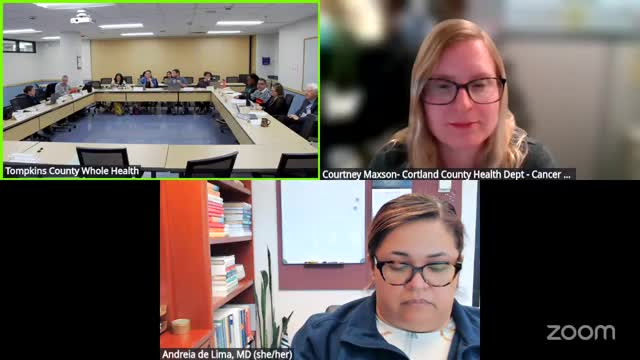Regional cancer services coordinator outlines screening, outreach and Medicaid treatment coverage for eligible residents
Get AI-powered insights, summaries, and transcripts
Subscribe
Summary
Courtney, coordinator for the Cancer Services Program covering Cayuga, Cortland and Tompkins counties, briefed the board on eligibility, tests offered, outreach partners and the program’s linkage to Medicaid treatment coverage for diagnosed patients.
Courtney, the cancer services program coordinator for Cayuga, Cortland and Tompkins counties, told the Board of Health the program focuses on screening uninsured residents age 40–64 (at or below 250% of the federal poverty guideline) for breast, cervical and colorectal cancers and works with contracted providers to deliver exams and diagnostics.
“The purpose of me coming is to just discuss about, what the cancer services program can offer, and what we do offer to Tompkins County residents,” Courtney said, describing enrollment, referrals to contracted providers and case management for positive findings.
Courtney outlined the program’s screening options: clinical breast exam and mammography for breast cancer; Pap and HPV testing for cervical cancer; and at‑home FIT (fecal immunochemical test) kits for average‑risk colorectal screening, noting the U.S. Preventive Services Task Force and related recommendations have lowered routine screening to start at 45.
“For people who are at average risk, a colon cancer screening kit will be sent to them through our program, because the kit that is completed is better than no kit at all,” she said. She added that the program arranges colonoscopy consultation and follow‑up when FIT results are positive.
Courtney described outreach strategies aimed at hard‑to‑reach populations — working with food pantries, soup kitchens, churches (including St. James of Zion and Harriet Tubman of Zion), Southside Community Center and Booker T. Washington organizations — and using mobile screening vans to bring services into communities. She named Nancy Calocerto as the program’s education and outreach staffer covering Tompkins and Cayuga counties.
She also described a Medicaid cancer‑treatment pathway: when a person screened through the program is diagnosed with breast, cervical or colorectal cancer, program staff apply for the Medicaid cancer treatment program; Courtney said almost everyone she has referred has been accepted into that treatment coverage.
Courtney provided the statewide intake number for the Cancer Services Program: 1‑866 (number is the statewide line) and offered to share her contact information for local coordination. Board members had no questions that required action; the presentation was informational.
